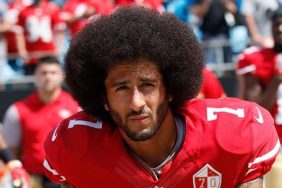Image: GQ Magazine
The NFL may have turned its back on Colin Kaepernick, but there are many others ready to throw in their support for Kaepernick and his protest against police brutality and racial inequality.
GQ Magazine made its position clear when they named Kaepernick ‘Citizen of the Year’ and placed him on one of the covers for their “Men (And Woman) of the Year 2017” issue earlier last month. Gal Gadot, Stephen Colbert, and Kevin Durant were featured on the alternative covers.
Along with the announcement on Twitter, GQ provided a link to an article they published featuring a handful of interviews with some of Kaepernick’s closest friends and supporters.
The editors of GQ made some strong statements regarding the player, pointing out that Kaepernick is “one of the most gifted quarterbacks on earth” but has been “blackballed” by the NFL because of his silent protest when he knelt during the national anthem.
GQ: “…He did it for a clear reason, one that has been lost in the yearlong storm that followed. He did it to protest systemic oppression and, more specifically, as he said repeatedly at the time, police brutality toward black people.”
Kaepernick wanted to collaborate with GQ on the piece so that he could “reclaim the narrative of his protest” that has now been “hijacked by a president eager to make this moment about himself.” Kaepernick, recognized more now as an activist than a football star, has embraced that his silence can be powerful.
Striking a balance between that silence in order to avoid people twisting his words, as well as avoiding a “vacuum” that silence can also create, GQ and Kaepernick felt that one way to fill that silence was by paying homage to the stories of other athletes turned activists when fighting for civil rights.
They connected with one particular historical moment in which Muhammad Ali protested against the Vietnam War. GQ wrote that Ali “marched in Harlem with the Nation of Islam after he was drafted and refused to serve.” He continued to train even after being locked out of boxing for three years, “jogging in the streets” and known as the People’s Champ.
This inspired GQ to capture Kaepernick in Harlem among the people “he is fighting for.” The collection of photographs can be found here.
GQ wasn’t the only publisher that wanted to reward Kaepernick’s efforts. On November 30th, Sports Illustrated announced Kaepernick as the 2017 recipient of the Muhammad Ali Legacy Award. SI reported the decision was made due to Kaepernick’s steadfastness “in his fight for social justice” and his commitment “to his beliefs no matter the cost.”
The article details Kaepernick’s motivation and how the deaths of, for example, Philando Castile, Eric Garner, Alton Sterling, Tamir Rice, and Freddie Gray were on Kaepernick’s mind as he “quietly took a seat on the bench” in 2016.
When Kaepernick was asked about his actions two weeks later, he told the media: “To me, this is bigger than football and it would be selfish on my part to look the other way. There are bodies in the street.”
Sports Illustrated wrote that the reasons why Kaepernick protested from the beginning, his truth, has been “twisted, distorted, and used for political gain,” losing income and the ability to play his dream NFL career over the past year. A sacrifice he was reportedly willing to make.
SI also stated that Kaepernick does not regret speaking his truth, nor has he “wavered from it” and that he has “donated nearly a million dollars to support it.” For those reasons, and more, SI and Muhammad Ali’s family were happy to honor Kaepernick with the Legacy Award.
Ali’s widow, Lonnie, said in a statement that she is “proud to be able to present this to Colin for his passionate defense of social justice and civil rights for all people. Like Muhammad, Colin is a man who stands on his convictions with confidence and courage, undaunted by the personal sacrifices he has had to make to have his message heard. And he has used his celebrity and philanthropy for the benefit of some of our most vulnerable community members.”
Kaepernick’s truth, SI described, stems from his determination to not look for approval in his actions, but to “stand up for people that are oppressed,” and to try to make the country better for all. Michael Rosenberg from SI concluded that the critics of Kaepernick are misguided, particularly with their focus on Colin and not the issues he has been protesting, and that it is “a rare person who gives up what he loves in exchange for what he believes.”
Throughout the GQ article, ten confidants of the former San Francisco 49ers quarterback discussed Kaepernick’s role as an activist: Filmmaker Ava DuVernay; activist Carmen Perez; rapper J. Cole; activist and national co-chair for Women’s March Tamika Mallory; writer and academic Ameer Hasan Loggins; NFL player Eric Reid; writer and scholar Christopher Petrella; activist Linda Sarsour; radio host/TV personality and activist, as well as Kaepernick’s partner, Nessa; and “artist, activist, legend” Harry Belafonte.
Below are some of the notable quotes from the group that participated:
DuVernay: “I see what he’s done as art. I believe that art is seeing the world that doesn’t exist… Look at this brother-he’s doing better than any of us would’ve done… With a lot more elegance.”
Perez: “We don’t need a movement full of experts. We need people who care deeply to stand up and offer what they have, because there’s a role for everyone.”
Cole: “…He wasn’t afraid. He was just being honest. And it didn’t seem like he was looking for attention… At some point in time, he becomes conscious about what’s happening in the world. And suddenly [standing for the national anthem] now feels uncomfortable… It feels like, Man, how can I stand for this thing when this country is not holding itself true to the principles it says it stands for? I feel like we’re lying… He was living his dream. He sacrificed his dream.”
Mallory: “I think that where an opinion turns into the oppression of another human being, a group of people, that’s where we must draw the line.”
Loggins: “I think people underestimate the tactical brilliance involved in [Kaepernick’s protest]… You can care about people and play sports… The problem is that his particular activism was toward the cause of blackness.”
Reid: “The next step is to get Colin back in the NFL. Because he’s the one that started this… These issues are real, and people know they’re real. But some will do anything to distract from that, to change the narrative…”
Petrella: “The most pernicious element of white backlash against Colin’s protest has been the way in which the narrative has been co-opted and re-framed so that taking a knee is now somehow synonymous with disrespecting the flag, with a lack of patriotism. The American flag is not a neutral ideology… When someone [tries to] point out the history, for instance, of the national anthem, or the emergence of the American flag and its various iterations over time… it becomes uncomfortable.”
Sarsour: “An activist is anyone who cares about something and has a talent that they’re willing to put toward it. Every single one of us needs to prioritize: What is it that touches your heart the most?”
Nessa: “Colin has always been helping people, he has always been involved, because he has empathy… It’s why he helped so many young children with heart defects get proper care-he’s been doing that for years… As long as you’re educated and you have the facts, get into those discussions about race. Have those conversations. I don’t care how intense they get… Be just in an unjust room.”
Belafonte: “In my 90th year of life, to see people like Colin Kaepernick having gotten the message and carrying the cause forward is the greatest reward I could ask for. Colin is a remarkable young man… I know how someone who is young can get the feeling that this is the worst things have been. I see how someone could think that. But it’s going to be okay. Even in the Trump era, America is going to be okay.”
To read the full interviews, check out GQ’s article here.









